Japanese TV seems to be obsessed with interviewing foreigners and asking them what they think of Japan. There's even a whole NHK show called "Cool Japan," where a bunch of foreigners sit around the studio opining about Japanese pickles and delivery services, discussing whether people in their home countries could learn something from how Japanese cope with summer weather, and deciding whether Japanese train stations are cool. You'd never see anything like it on American TV, presumably because Americans couldn't care less what any other country thinks of us.
I never imagined that I'd be one of those people – even once. Then on my last trip to Tokyo, in the space of less than a week I was followed around town by three different TV crews.
Chosen for Stardom
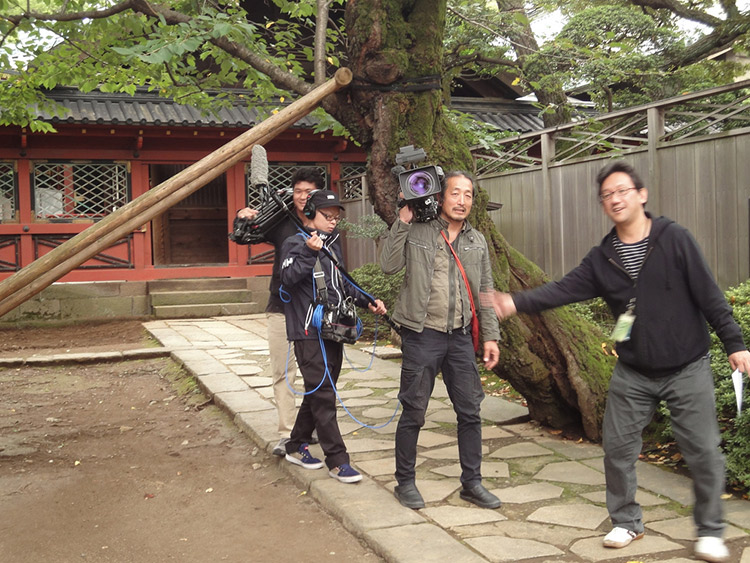
It was my first morning at a small traditional inn in Yanaka, in the old downtown of Tokyo, when I saw a sign at the front desk announcing that a TV crew was coming to interview guests. To some people this might have been exciting. Me, not so much. I have what you might call a face made for writing – I don't even like the way I look in photos, so the last thing I want is to see what I look like on TV.
But the innkeeper asked me to please show up, and he was such a nice old guy, and after all, probably they'd just ask a couple of questions and it would take only a few minutes. It would be no big deal, right?
Here's the thing I forgot: Just interviewing the foreigners isn't enough. You also need to get that footage of them walking around Japan.
I'm pretty sure the reason they asked me was that I was the only one travelling alone, which would make the whole deal less complicated. But I thought I had a Get Out Of TV Free card: I was there as a reporter, working on a travel article about the neighborhood. In the US, reporters aren't supposed to interview other reporters when they're looking for regular people.
Well apparently there's another cultural difference I wasn't aware of: instead, my job actually seemed to make me more interesting to them. And it turned out that they were also working on a story about the inn and the neighborhood. So how could I say no?
The Quantum Physics of TV
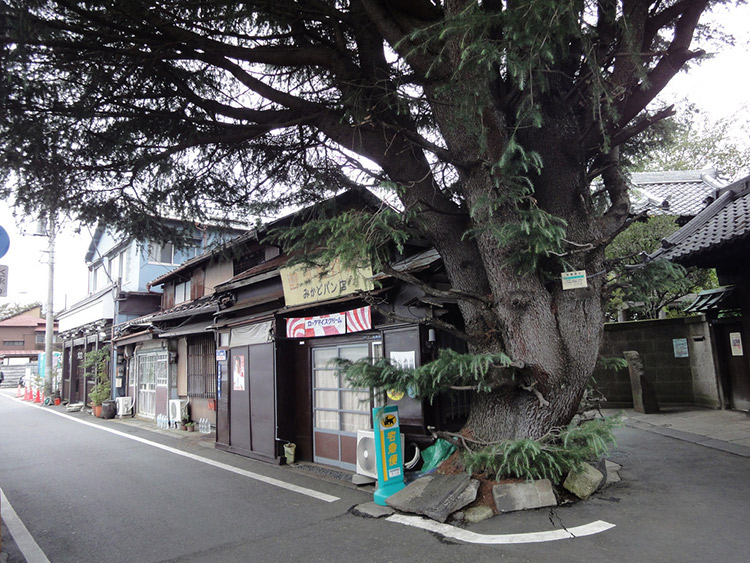
You know the Heisenberg Uncertainty Principle, which says that the mere act of observing something changes the thing being observed? That goes at least double when the observer is holding a TV camera. You could call it The Japanese TV Crew Principle: When a film crew says to go ahead with whatever you were going to do and they'll follow you around and nothing will change, don't believe it.
My plan was to go to the local shopping street and take photos for my article. I figured things wouldn't start opening till at least 10 AM. But now I had three guys with a bunch of expensive equipment waiting around with nothing to do. How could I make them wait another two hours?
So the observers ended up changing everything about the plan. We headed out, taking photos along the way, and I pointed out bits of local interest, and it turned out that none of them had ever set foot in Yanaka before. Like nearly every other Tokyoite I know, they knew nothing about this part of the city. So there I was explaining that this winding street was called Hebi-michi because it was shaped like a snake, as if they were the tourists and I was the local expert.
When we got to the shopping street, of course everything was closed – but I had a sudden inspiration for the next change of plan. There had been a second sign on the innkeeper's desk. It asked guests to sign a petition to save a big old cedar tree, an icon of the neighborhood, that was on a piece of property that had been bought by a developer. Immediately I had a vision of myself as the crazy American lady who became a local heroine by getting the tree on TV and inspiring all of Tokyo to save it.
I dragged the crew way the heck back across the neighborhood to this tree. They filmed it at great length, hanging on my every word as I told the story, to the extent that I started to worry that I was not exactly what you'd call an expert source on this particular topic. I was relieved to find an explanatory poster nearby and made them read it. I know it's not really likely that this TV show is going to start a big Yanaka Cedar Preservation Movement, but if it does, at least they'll have their facts straight.
Stage Directions
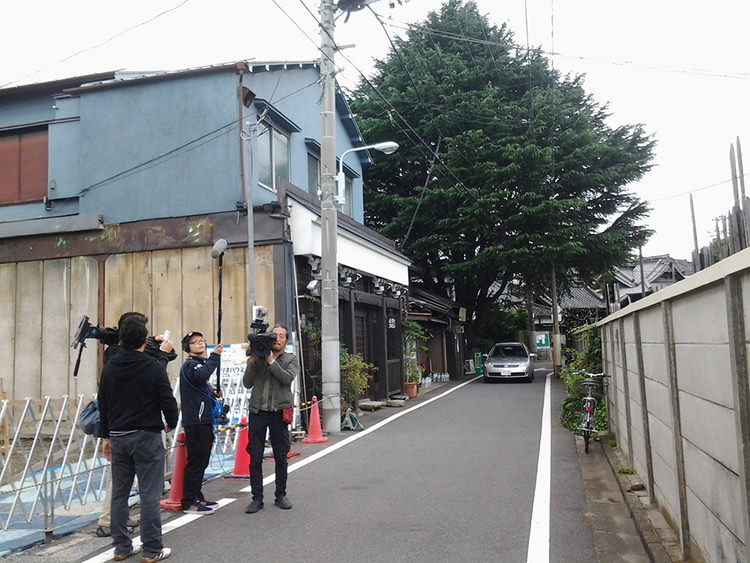
After another detour to a shrine, it was finally late enough to go shopping, so we headed back to the shopping street, Yanaka Ginza. Which brings us to another way in which you shouldn't believe a film crew when they say they'll just film you carrying on as normal. Yes, they will do that a good part of the time. But if you're going to a shrine, of course they're going to want a shot of you washing your hands with the ladle in your clumsy, unaccustomed way, whether you were planning to do so or not. And if you're going to walk up the iconic stairs at Yanaka Ginza – which a film crew is likely to recognize from TV shows even if they've never been in the neighborhood before – of course they're going to ask you to wait while they run ahead and get a shot of you from the front.
Some shots are just too important to trust to un-directed reality, I guess. And after three hours or so, the stage-managing had come to seem normal, and it had all actually been fun. Still, I was totally OK with the fact that after I took all the photos of crafts stores and bakeries and sweet shops that I needed, it was time to say that it had been great working with them and I was done now.
I was a bit bewildered when the guy in charge replied by asking if I was sure I didn't want something to eat. Why did he care? Was he offering to buy me lunch in some very roundabout way? And then it dawned on me. "You want me to eat something so you can film it," I said, and he kind of sheepishly agreed.
So, I bought and ate an apple turnover. Hey, I can take a baked good for the team with the best of them.
Strange Feeling of Deja Vu
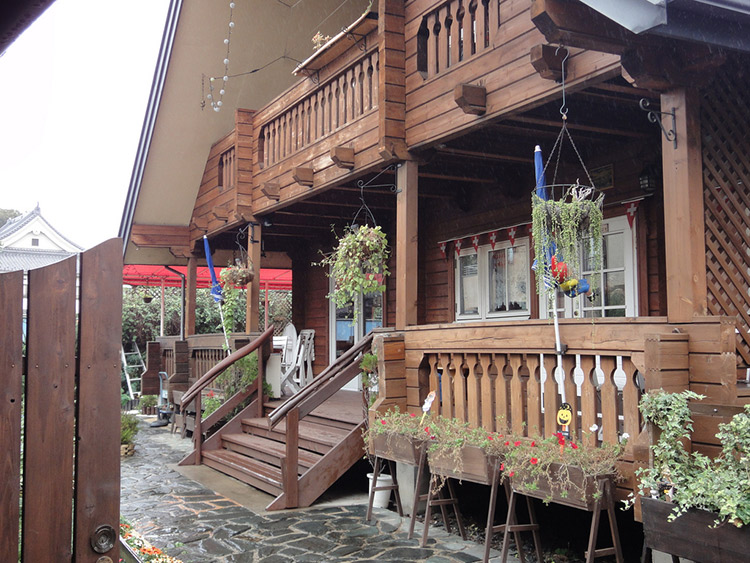
The next day I was surprised to see that the sign about the TV crew was still there on the front desk. The innkeeper was pretty on the ball and it didn't seem like the kind of thing he'd forget and leave lying around. It wasn't, as it turned out. There was going to be another, different film crew.
This one was doing a piece on what foreigners thought about the upcoming Tokyo Olympics, which of course would also need the obligatory footage of the foreigner walking about the city. No point in messing with success, I guess, so the innkeeper pointed me out.
This morning, my goal was the most un-Japanese destination possible: a Swiss chalet, built by a Swiss guy who'd lived in the neighborhood for many years, who I was hoping to interview. When we arrive, the owner is out, and the manager is understandably kind of freaked out by this bizarre parade of a foreign reporter followed by a crew of local reporters. It takes the head of the film crew about ten minutes just to convince him to call his boss and ask if he's willing to talk to us.
When it turns out that the owner won't be back for 30 minutes, the crew decides they can't wait and heads back to the inn, and I'm relieved that I won't be on a second TV show after all. And I definitely I got the best end of this bargain – they walked around in the rain for an hour and probably can't use the footage, but since they were there to speak Japanese to the manager for me, I'm going to get my interview.
But when I return to the inn afterwards, I find out I have not escaped my fate: the crew is still there. So I get interviewed after all, expressing my profound opinions on the Tokyo Olympics including "I hate tearing down old things to build new things," and "Isn't Tokyo crowded enough already?"
Getting to Be A Habit
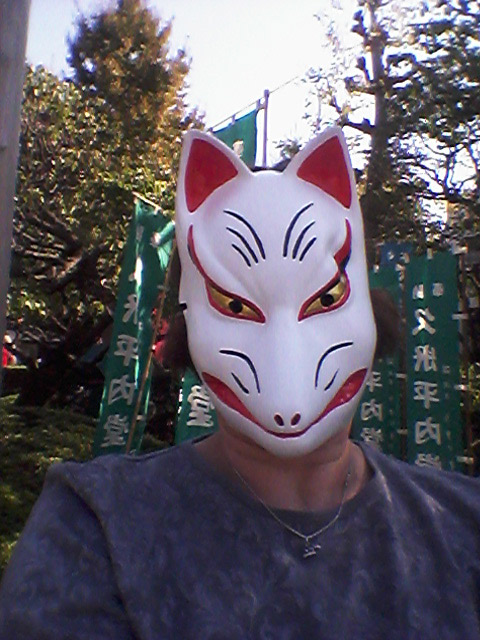
The next day I make a joke about "Where's today's film crew?" and get back to my solitary plans… but not for long. Two days later, there it is: the sign is on the desk again. Yes, it's a third, different TV crew.
My plans for the day are to go to the zoo to see tanuki (a most adorable Japanese canine that I love) and to Yoyogi Park, so the big difference this time turns out to be the need to get permission to film from bureaucracies. The zoo won't let them bring in the big cameras, so the two guys go ahead to Yoyogi to wait for us. Even for the translator to use her little camera, we need to make a long detour to get a press pass.
As a staff member fills out the forms, he asks us what exhibit we're planning to film, and reveals to my disappointment they don't have tanuki anymore. So instead I'm filmed at the other exhibit I visit every time I'm in Tokyo, the tapir and capybaras (I loooove capybaras), and I console myself with the fact that since we had to come to this behind-the-scenes office, I got to take a photo of the zoo commissary and a bunch of neatly stored cleaning tools. (I know that might not thrill the average person who doesn't make a special trip to see tanuki, but since I used to work as a zookeeper, to me it was pretty cool.)
After lunch, it's time for more stage management: the translator films me walking into Ueno Station, and then when we get off the train, asks me to wait while she goes out and finds the rest of the film crew so they can film me walking out of the station.
And then, there's another detour: we get in a car and drive to an office the other side of the huge park. While the translator is filling out the paperwork for permission to film, I discover that this is also where you get a permit for a nearby dog park. So now it's my turn to change the plan: the crew has to stand outside the fence of a huge dog park while I play with a pug named Pu.
Prepare for Your Close-up
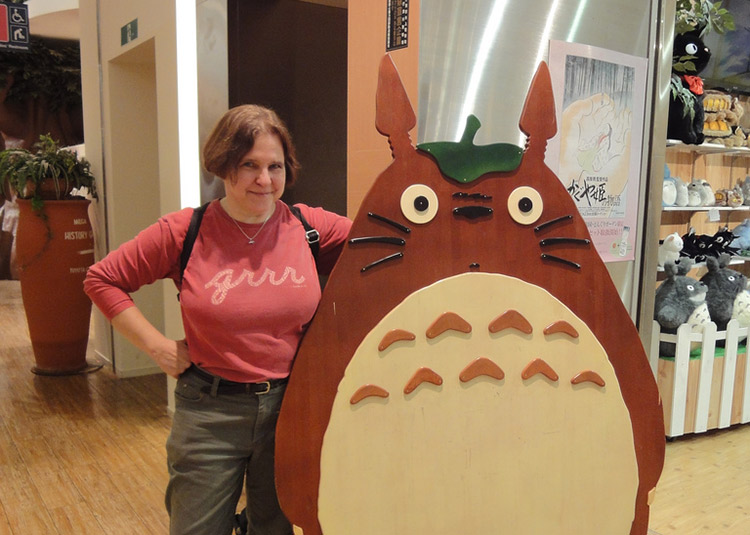
Eventually I leave the pug and we drive all the way back to where we started. They film me walking around the park, and we finally finish up with an interview. Which brings us to the other things to keep in mind, aside from the Japanese TV Crew Principle, if you ever find yourself in this situation.
The first is, don't get your hopes up about how much screen time you're going to get. As one translator explained, they have to keep the cameras running the whole time, because they'll kick themselves if something cool happens and they miss it. The third crew was with me from first thing in the morning to the late afternoon. The end result? As one of my Japanese friends who saw it reported, no more than two minutes of me eating ice cream and looking at a capybara.
The other is that no matter what their story is about, they're going to ask you what you like about Japan and how more foreigners could be convinced to travel there.
For me they're both impossible questions to answer. For the latter I want to say, why are you asking me? I'm someone who IS travelling here. I can't put myself in the head of someone who doesn't want to come to Japan. And it sounds awfully ugly-American-y, even if true, to say that what most Americans probably want is for the Japanese to speak more English.
And any halfway accurate answer to the first question would be way too long and weird for a sound-bite. I don't think anyone really wants to hear that I wanted to see the tanuki because they exist at the intersection of my interests in yokai and in how much the Japanese seem to love uncommon animals.
So I mostly stuck to an awkward shrug and "I really love the food," and while it sounded kind of dumb, I'm pretty sure it was for the best.
